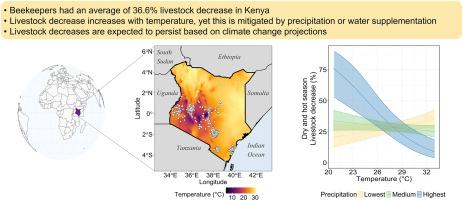气候对蜜蜂的影响可以通过肯尼亚的养蜂管理来减轻。
IF 8.4
2区 环境科学与生态学
Q1 ENVIRONMENTAL SCIENCES
引用次数: 0
摘要
近几十年来,世界范围内对蜜蜂健康的关注促使人们开展调查,以监测蜂群的损失,而撒哈拉以南非洲地区在这方面的代表性有限。在气候变化的背景下,了解气候如何影响殖民地损失已经变得至关重要,但关于这一主题的文献很少。我们首次进行了一项调查,估计了肯尼亚2021-2022年蜂群的牲畜减少情况,以探讨温度和降水等环境条件对牲畜减少的影响。我们从养蜂人的角度定义“牲畜减少”,包括死亡的蜂群,但在热带地区的特定背景下,也包括从养蜂场逃跑的蜂群。共有来自不同地区的589名养蜂人参与了这项调查。肯尼亚养蜂人在2021-2022年平均减少36.6%的牲畜,干燥和炎热季节(31.9%)的降幅高于潮湿和寒冷季节(20.2%)。我们发现,无论是干热季节,还是湿冷季节,牲畜数量的减少对温度的影响都更大。有趣的是,我们发现降水在两个季节都减轻了温度对牲畜减少的影响。最后,我们发现,在干热季节,养蜂人进行补水比不进行补水的养蜂人减少了10%的牲畜数量,这表明这是一种相关的适应策略,可以减轻牲畜数量的减少。值得注意的是,养蜂人可以通过诱捕蜂群来更新他们的种群,但这意味着时间和诱饵材料的成本。根据气候变化预测,我们预测2050年和2100年的年度和季节性牲畜减少量将保持在相同的范围内。这些结果指出了肯尼亚养蜂人在饲养牲畜方面的困难,并为在气候变化背景下采取的策略提供了线索。本文章由计算机程序翻译,如有差异,请以英文原文为准。

Climate effects on honey bees can be mitigated by beekeeping management in Kenya
In recent decades, worldwide concerns about the health of honey bees motivated the development of surveys to monitor the colony losses, of which Sub-Saharan Africa has had limited representation. In the context of climate change, understanding how climate affects colony losses has become fundamental, yet literature on this subject is scarce. For the first time, we conducted a survey to estimate the livestock decrease of honey bee colonies in Kenya for the year 2021–2022 to explore the effects of environmental conditions, such as temperature and precipitation, on livestock decrease. We define “livestock decrease” from the beekeeper's perspective, including dead colonies but also, in the specific context of the tropics, the colonies that absconded from the apiary. A total of 589 beekeepers from a variety of areas participated in the survey. Kenyan beekeepers had an average of 36.6% livestock decrease in 2021–2022, with higher decreases during the dry and hot (31.9%) than during the wet and cold season (20.2%). We found that livestock decreases were more important with temperature for both dry and hot and wet and cold seasons. Interestingly, we found that precipitation mitigated temperature effects on livestock decrease for both seasons. Finally, we found that beekeepers practicing water supplementation had up to 10% less livestock decrease during the dry and hot season than those that did not, suggesting it to be a relevant adaptive strategy to mitigate livestock decrease. It is worth noting that beekeepers can renew their stock by trapping swarms, yet this represents a cost in time and baiting materials. Based on climate change projections, we predicted that annual and seasonal livestock decrease would remain in the same range at horizon 2050 and horizon 2100. These results pinpoint difficulties in maintaining livestock for beekeepers in Kenya and provide clues for strategies to pursue in the context of climate change.
求助全文
通过发布文献求助,成功后即可免费获取论文全文。
去求助
来源期刊

Journal of Environmental Management
环境科学-环境科学
CiteScore
13.70
自引率
5.70%
发文量
2477
审稿时长
84 days
期刊介绍:
The Journal of Environmental Management is a journal for the publication of peer reviewed, original research for all aspects of management and the managed use of the environment, both natural and man-made.Critical review articles are also welcome; submission of these is strongly encouraged.
 求助内容:
求助内容: 应助结果提醒方式:
应助结果提醒方式:


